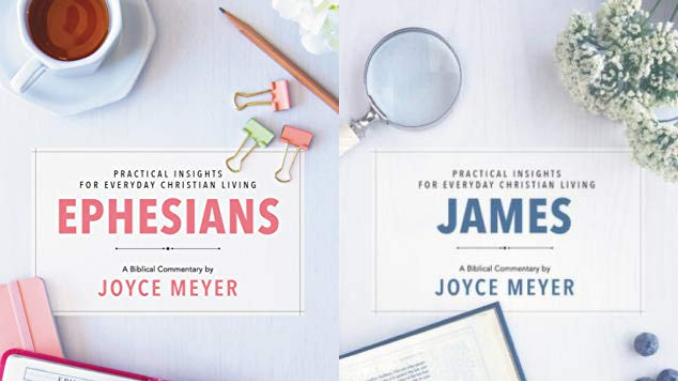
Series: Deeper Life #1
Published by FaithWords on March 5, 2019
Genres: Non-Fiction, Christian Life, Devotional
Buy on Amazon
Goodreads

James: Biblical Commentary by Joyce MeyerJoyce's first-ever biblical commentary series provides eye-opening teachings that will help you develop a stronger relationship with God. As you take the time to study His Word, you'll see how much He loves you and who you are in His image. Change will come, and your life will bear the good fruit that God intends!
Series: Deeper Life #2
Published by FaithWords on March 5, 2019
Genres: Non-Fiction, Christian Life
Buy on Amazon
Goodreads

In this comprehensive biblical commentary, Joyce Meyer offers you practical insights for studying the book of James, with room for personal reflections that will help you grasp the truths in God's Word. You'll discover how to identify life-changing wisdom and get a better understanding of God's plan and purpose for your life.
As someone who has long cast a wary eye on Joyce Meyer’s ministry, I came to these two devotionals with a rather critical eye. Meyer edges toward the prosperity gospel in some of her teaching and I’m not in alignment with some of her views on atonement and a few other issues. Moreover, while Meyer is a popular teacher, she has no formal academic theological training, so I found it interesting that she was publishing these commentary volumes.
Design/Overview
It quickly became evident that “commentary” is a generous term. This is not so much an exegetical look at Scripture, but a topical and devotional overview of Ephesians and James. This isn’t a bad thing, because it plays to Meyer’s strengths as a writer. It’s a call back, almost, to the beginnings of her ministry leading a Bible study. Just a group of people gathered around to talk about a certain portion of the Bible.
Each book runs about 150 pages and is divided into 12 chapters. This means that Meyer divides each book into twelve main sections, the sub-divides those chapters into individual sections of verses for her devotionals. There’s no real consistency with how much time Meyer spends in each section. Some sections of Scripture are covered in a paragraph or a page. Others might be two or three pages.
Occasionally, there’s a section for personal reflection, but this doesn’t have any consistency either. Most often, they come at the end of a section. Other times, they come in the middle. Some sections don’t have one at all. This design element is something I found a bit distracting—it was all a bit too much stream-of-consciousness for my liking.
Use of Scripture
This series primarily uses the Amplified Version, which is quite the unusual choice. This version of Scripture seeks to provide explanation, excurses, or alternate meanings within the text to amplify its meaning. It is based upon the ASV. For example, Ephesians 2:8-9 reads like this:
“For it is by free grace (God’s unmerited favor) that you are saved (delivered from judgment and made partakers of Christ’s salvation) through [your] faith. And this [salvation] is not of yourselves [of your own doing, it came not through your own striving], but it is the gift of God; Not because of works [not the fulfillment of the Law’s demands], lest any man should boast. [It is not the result of what anyone can possibly do, so no one can pride himself in it or take glory to himself.]
While the AMP can be helpful, it is important to remember that Bible translators choose a particular translation for a word for a reason. The fact that a word can have different meanings does not mean that every possible meaning is a valid rendering each time the word occurs. For me personally, reading this version gives me ADHD. I can’t focus on the Scripture for the all the interjected commentary. I personally found its constant use a distraction.
Theology
For all the concerns about Joyce Meyer’s theology, there was nothing that stood out within these two volumes that made me cringe. Perhaps some areas that I didn’t necessary agree with 100%, but in all honesty, the commentary remains at such a surface level, there’s not much substance to disagree with.
These volumes are more about application than theology. Meyer isn’t parsing the Greek or citing systematic theologies. This is a popular-level volume that is meant to be a devotional style read (and would have benefitted from being better organized as one). They’re encouraging and motivational. If you’ve been a fan of Joyce, either through her previous books or her television and radio shows, this will probably appeal to you.
While I have nothing particular against this series, I don’t have much for it either. Nothing about it inherently stands out as amazing. As a pastor, there are better lay-level devotional commentaries that I would recommend before these—Warren Wiersbe’s BE series and N.T. Wright’s For Everyone series topping that list. If you want a sneak peek before committing to buying this series, check out this link, where you can sign up for a four-day devotional series from Ephesians and learn more about the books.
